Filter by
Constitutional challenges in the algorithmic society
Technologies have always led to turning points for social development. In the past, different technologies have opened the doors towards new phase of growth and change while influencing social values and principles. Algorithmic technologies fit within this framework. Although these technologies have positive effects for the entire society by increasing the capacity of individuals to exercise ri…
- Edition
- -
- ISBN/ISSN
- 9781108843126
- Collation
- x, 330 pages ; 24 cm
- Series Title
- -
- Call Number
- 342 MIC c

Defending checks and balances in EU member states : taking stock of europe’…
This open access book deals with Article 7 TEU measures, court proceedings, financial sanctions and the EU Rule of Law Framework to protect EU values with a particular focus on checks and balances in EU Member States. It analyses substantive standards, powers, procedures as well as the consequences and implications of the various instruments. It combines the analysis of the European level, be i…
- Edition
- 1
- ISBN/ISSN
- 9783662623176
- Collation
- x, 480p. : ill.
- Series Title
- Beiträge zum ausländischen öffentlichen Recht und Völkerrecht
- Call Number
- 342.4044 DEF d
Judicial law-making in European constitutional courts
This book analyses the specificity of the law-making activity of European constitutional courts. The main hypothesis is that currently constitutional courts are positive legislators whose position in the system of State organs needs to be redefined. The book covers the analysis of the law-making activity of four constitutional courts in Western countries: Germany, Italy, Spain, and France; an…
- Edition
- -
- ISBN/ISSN
- 9781003022442
- Collation
- viii + 269 p
- Series Title
- -
- Call Number
- 347.40352 JUD j
The law and practice of the Ireland-Northern Ireland protocol
The Ireland-Northern Ireland Protocol, part of the Withdrawal Agreement concluded between the European Union and the United Kingdom, is intended to address the difficult and complex impact of Brexit on the island of Ireland, North and South, and between Ireland and Great Britain. It has become an exceptionally important, if controversial, part of the new architecture that governs the relationsh…
- Edition
- 6
- ISBN/ISSN
- 9781009109840
- Collation
- 204p
- Series Title
- -
- Call Number
- 341.37094 LAW C

Contemporary French Administrative Law
Despite the growing scholarly interest in comparative public law, there remain relatively few works on the subject. Contemporary French Administrative Law aims to redress that imbalance, offering English-language readers an authoritative introduction to the key features of French administrative law and its institutions. The French legal system is among the most well-developed and influential in…
- Edition
- -
- ISBN/ISSN
- 9781009057127
- Collation
- xxxvii, 380p,: ill
- Series Title
- -
- Call Number
- 342.4406 JOH

Illiberal trends and anti-EU politics in East Central Europe
This open access book provides an in-depth look into the background of rule of law problems and the open defiance of EU law in East Central European countries. Current illiberal trends and anti-EU politics have the potential to undermine mutual trust between member states and fundamentally change the EU. It is therefore crucial to understand their domestic causes, context conditions, specific p…
- Edition
- -
- ISBN/ISSN
- 9783030546748
- Collation
- xx, 353p ; ill
- Series Title
- -
- Call Number
- 320.3 MIC i
A sociology of transnational constitutions : social foundations of the post-n…
This volume focuses on the rise of transnational constitutional laws, primarily created by the interaction between national and international courts, and by the domestic transformation of international law. Through detailed analysis of patterns of institutional formation at key historical junctures in a number of national societies, it examines the social processes that have locked national sta…
- Edition
- -
- ISBN/ISSN
- 9781139833905
- Collation
- x, 520p. : ill.
- Series Title
- -
- Call Number
- 342.029 THO s

Constituting religion : Islam, liberal rights, and the Malaysian state
Most Muslim-majority countries have legal systems that enshrine both Islam and liberal rights. While not necessarily at odds, these dual commitments nonetheless provide legal and symbolic resources for activists to advance contending visions for their states and societies. Using the case study of Malaysia, Constituting Religion examines how these legal arrangements enable litigation and feed th…
- Edition
- -
- ISBN/ISSN
- 9781108539296
- Collation
- x, 187p. : ill.
- Series Title
- -
- Call Number
- 342.595085297 MOU c
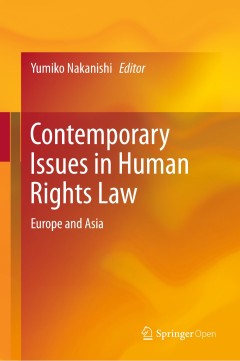
Contemporary issues in human rights law : Europe and Asia
This book analyzes issues in human rights law from a variety of perspectives by eminent European and Asian professors of constitutional law, international public law, and European Union law. As a result, their contributions collected here illustrate the phenomenon of cross-fertilization not only in Europe (the EU and its member states and the Council of Europe), but also between Europe and …
- Edition
- -
- ISBN/ISSN
- 9789811061295
- Collation
- x, 219p. : ill.
- Series Title
- -
- Call Number
- 342.4085 CON c
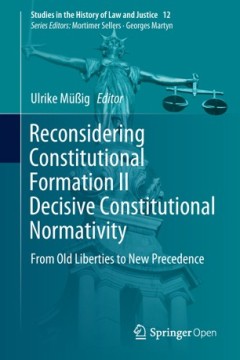
Reconsidering constitutional formation II decisive constitutional normativity…
This second volume of ReConFort, published open access, addresses the decisive role of constitutional normativity, and focuses on discourses concerning the legal role of constitutional norms. Taken together with ReConFort I (National Sovereignty), it calls for an innovative reassessment of constitutional history drawing on key categories to convey the legal nature of the constitution itself (na…
- Edition
- -
- ISBN/ISSN
- 9783319730370
- Collation
- xii, 419p. : ill.
- Series Title
- -
- Call Number
- 340.1 REC r
 Computer Science, Information & General Works
Computer Science, Information & General Works  Philosophy & Psychology
Philosophy & Psychology  Religion
Religion  Social Sciences
Social Sciences  Language
Language  Pure Science
Pure Science  Applied Sciences
Applied Sciences  Art & Recreation
Art & Recreation  Literature
Literature  History & Geography
History & Geography